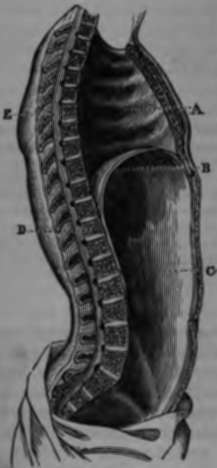Chapter VII. Digestion
Description
This section is from the book "Wonders Of The Human Body", by Auguste Le Pileur. Also available from Amazon: Wonders of the Human Body.
Chapter VII. Digestion
Waste of the organism repaired by alimentation,—Hunger.— Thirst.—Organs of digestion ; abdominal cavity, peritoneum.—Digestive apparatus.—Mouth, lips, cheeks, teeth, palate, soft palate, tongue.— Pharynx.—CEsophagus.—Stomach.—Intestinal canal; small intestine, large intestine, intestinal convolutions, mesentery, omentum.—Mucous membrane. —Liver.—Pancreas.—Spleen.—Kidneys.— Mechanism of digestion.—Digestion of the stomach, gastric juice, peristaltic movement, chyme.—Intestinal digestion, bile, pancreatic juice, chyle.—Absorption; endosmosis, exosmosis, functions of the veins and lymphatic vessels in absorption, rapidity of absorption.
Digestion
The human body loses every day through various channels, by exhalation or excretion, about 310 grains of nitrogen, an essential principle of animal matter, and 6 1/2 lbs. of water, and burns 10 1/2 ounces of carbon in contact with the oxygen of the atmosphere. A very short time, therefore, is sufficient to exhaust the organism if it does not find in the alimentation the new elements by which it is reconstructed. Of this unceasing necessity of repairing the loss which the organs sustain by the action of life, man is imperiously reminded by hunger and thirst; hard conditions of existence. He can support the first of these wants for a time, which varies according to age and individual strength; it is a sensation agreeable at first, but it soon becomes a torture, a succession of atrocious pains, and moral and physical destruction follow. The annals of hunger are terrible in science and in history; it has been called, with too much reason, an evil counsellor, and he who has the means to appease it each day should be thereby reminded of those less fortunate than himself.

Fig. 21. Section of the trunk and its cavities in the median line.
a. Cavity of the chest.
b. Diaphragm.
C. Abdominal cavity.
d. Vertebral column. E. Spinal canal.
Thirst is a sensation painful from the first, and can be borne for a shorter time than hunger; for it necessarily implies the privation of all liquid aliment, and exhaustion supervenes much sooner than when a man is deprived of solid food, but is able by the aid of a little water to prolong his life for some days.
The organs of digestion, of which we will give a summary idea, are, for the most part, contained in the abdomen.
Continue to:
